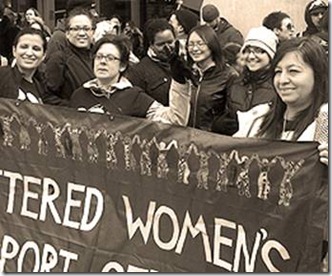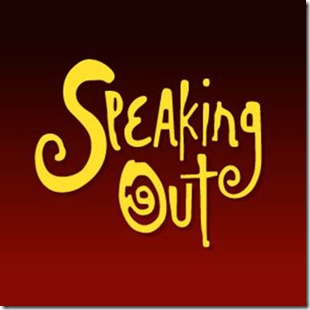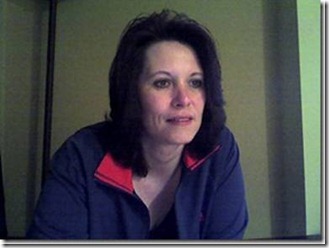Survivors Speak Out to Break Silence about Systemic Violence Against Women and Girls
by Joanna Chiu
If you took a poll of everyone you know, very few might say that they support violence and abuse against women and girls.
But all over the media, footage of a woman being punched in the face can be used to promote a reality show, a video of a woman in a neck brace after “rough sex” can be used to promote a vegetarian diet, and artists rapping and singing in a mansion filled with corpses of women hung by chains can be passed as an “artistic” music video.
If you keep watching those shows, supporting the same artists and organizations, playing violent video games or subscribing to the same magazines without thinking about what you’re accepting, like it or not, you are actually supporting violence against women and girls.
The philosophy of Battered Women’s Support Services is that battering does not take place between two people in isolation—violence and abuse happens in a social context, and is deeply rooted in a system that supports the right of some people to oppress others based on privileges such as gender, race, religion, class, sexual orientation, age and physical ability.
The kinds of systems of oppression that perpetuate violence against women are reflected in and promoted through the media, so for Prevention of Violence Against Women Week, BWSS asked me to help bring together media makers and activists in dialogue about how to end systemic violence against women and girls.
Throughout the past week, my blog posts have discussed different messages in the media that take away the agency of survivors of violence and marginalized groups—misrepresenting them instead with highly damaging ideas: Women are sluts, women of colour are really big sluts, women are asking for it, women are crazy “psycho bitches.”
Those media messages, brought to you by the 3000 ads you see every day, and from a myriad of news and entertainment outlets, promote a culture of violence—and a culture of silence.
The debilitating fear, shame and self-blame that many women feel after surviving sexual assault, domestic violence or abuse keep most from reporting the crimes to police, and even from telling their closest friends and family. As a result of this culture of silence and victim blaming, 97% of rapists will not spend one day in jail (Source: RAINN).
The idea of sharing their stories with the broader public, even if it is to raise awareness about violence, is something that few survivors are willing to do.
But as someone who has worked on media outreach for several activist events and human rights organizations, I know that telling personal stories is a powerful way to engage the public to take action (as Jennifer Pozner explained on Day 3). That was why for the first time, I wrote briefly about being sexually assaulted in my introductory blog post for this campaign. But that was very hard to do. After the piece was published, I stayed away from my computer for a while, scared of what the feedback might be, and I had a sick feeling in my stomach all day.
A part of the reason I had the courage to share my story was because my friend Holly Meyer had done it last year. Last fall, she wrote about being raped by a trusted friend in the New York Daily News (a very mainstream newspaper):
One night in January, after a lot of dancing at a party in Brooklyn, a male neighbor and I made our way back to our building less than a mile away. We’d been drinking, but nothing unusual for twenty-somethings on a Saturday night…The next thing I know I’m feeling my pants being pulled down off my body. I heard the neighbor mutter, "Time to take charge of this situation." And then I felt a small penis trying to enter me from behind. "No. Stop. No. Stop," I said. I was in complete shock as I felt him enter me twice while I continued to say, "No. Stop. No. Stop." I then felt him lift his weight off of my body and retreat. I felt frozen and totally incapacitated. I didn’t realize fully what happened to me for at least the next 24 hours, stunned that my neighbor would sexually violate me.
When I talked to Holly about what she hoped to achieve by telling her story, she told me:
“I never reported what happened to the police and never
even told a friend until 3 to 4 months after the fact…I think if anyone read it and then found the courage to open up to someone and talk about an assault that they’d kept a secret, I’d be incredibly humbled.”
Sadly, stories such as Holly’s are very common. 1 in 2 Canadian women has survived at least one attack in her lifetime, and in 2005, an average of Three women a day were murdered by their intimate partners in the U.S. 15% of sexual assault victims are children under the age of 12.
That is why personal stories are most impactful when they are told in conjunction with a clear message that violence does not happen to individuals in isolation—they happen because we live in a society that promotes violence against women and girls. Often, media outlets feature personal stories in a sensationalized way, without tying them to broader patterns of violence.
Sometimes, survivors do not choose to tell their stories directly, but tell their stories through media representatives, journalists and other media makers. Before you tell a personal story in the media, whether it is your own or someone else’s, consider these guidelines from Esther Shannon, a Vancouver human rights advocate and former editor of Kinesis magazine:
· Keep in mind that the media may get the story wrong. The media can sensationalize or simplify, and miss many of the nuances. The media also likes conflict and may search out contrasting views to the survivors’ and call that “objectivity.”
· Media reps need to prepare, support and protect women willing to expose themselves to the media the best they can. Reps have to be honest to survivors about what might happen with their story after they share it with the public.
· To try to prevent sensationalism or misrepresentation in the media, it is absolutely essential to follow up, both to say thanks when it’s merited and to provide respectful feedback when they get it wrong.
There are also a variety of online forums that survivors of violence and abuse can use to share their stories anonymously, including Dancing in the Darkness and Escaping Hades (More listed below).
In addition to providing a full range of services and support, including a crisis hotline, counseling, legal help, referrals, advocacy and employment programs, Battered Women’s Support Services can work with survivors to help them share their stories with the public on this blog and on other forums.
I want to conclude by sharing an essay written by BWSS client Rhonda Lee Vermette, which was originally posted on January 24, 2012.
Thank you very much for the tremendous support and feedback on this week’s campaign. Let’s keep this dialogue going. Please do not hesitate to contact me at editor.joanna@gmail.com or @joannachiu, or join me in a community of feminist media critics at WAM! Vancouver, WAM! international, or Women in Media and News.
Joanna
—
Please Don’t Give Up…I Didn’t
By Rhonda Lee Vermette
About a year ago now, I was phoning around trying to find domestic violence counseling services for myself. I had phoned a few places and as I tried to explain the situation that I had been court ordered to take domestic violence counseling, most places would not listen to me after they heard that. I had made the attempt to explain that it was not because I was an abuser, but that I was the abused and how I even got myself into the criminal activity was that I was bullied into it by my abuser, thus resulting in the domestic violence counseling sentence. I finally contacted Battered Women’s Support Services (BWSS) and they listened to what I had to say and I was in for my first session within days.
I am originally from a small Saskatchewan city and spent 15 years in an extremely abusive relationship (in every aspect) with my abuser passing away 6 months prior to starting counseling here in Vancouver. During the last 4 years of the relationship we were under investigation for drug trafficking which resulted in my sentence and during that investigation, police listened live to me being beaten and/or raped on more than one occasion but never intervened in order to protect their drug intervention. I wasn’t able to deal with the many different ways I was affected, until I had started the counseling at BWSS.
I was really lost, limiting my contact with the outside world by never leaving my house other than for appointments with physicians, lawyers or counseling sessions. I had become quite anti-social which is not normal for me. My counseling sessions have brought me to talk about the devastating things that have happened to me and the survival skills and techniques I developed over time. The abuse I had experienced over the years had changed me in so many ways that I had never even realized it. I believe my biggest issues were fear and trust. I say this because of the extreme levels of abuse I suffered and how I interacted with other people. One thing I remember is during these assaults I would wish for someone to walk in and stop them. To later find out the police were there and listening, turning blind eyes to what was happening to me, almost absolutely destroyed me.
Now that I have been in counseling for a year, I have come to terms with what happened to me was wrong and something that I can never turn the clock back on. But, I can start making changes for the future not only for myself, but for other victims of domestic violence by telling my story and how I managed to survive. BWSS has given me back my courage and strength as a woman to deal with my pain and anger. They have also made me aware that I am not alone in my suffering. They play a huge role in my path of healing and if not for them I do not know where I would be today. PRAISE to you, the staff and volunteers at BWSS, for giving me back to me, my family and the rest of the world.
More Survivors’ Stories
BWSS client essay: “This is my Journey by Anon”








You are so right. Standing up and telling the truth is the best thing we can do for ourselves and for others. Of all I have ever done professionally in three decades as a journalist, professor, author, speaker, writing my first book, a memoir in 1999 about my experience with domestic violence remains the source of the most pride– and reward. The letters I still receive weekly from women all over the world remind me that in honesty and authenticity we have strength, and that one story can be impetus for someone else to tell her story. Amen. Thank you.
Dear Michele,
Thanks so much for the feedback. I look forward to reading your book. I plan to write more about violence against women, and I’d love to talk to you sometime.
Joanna